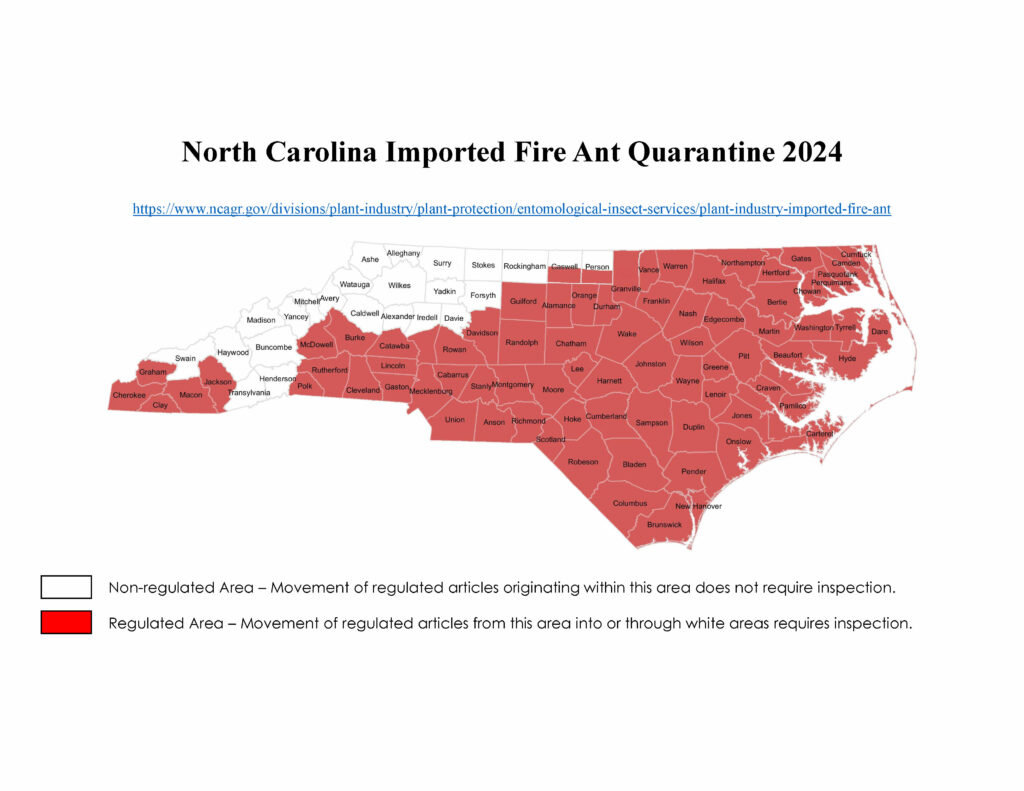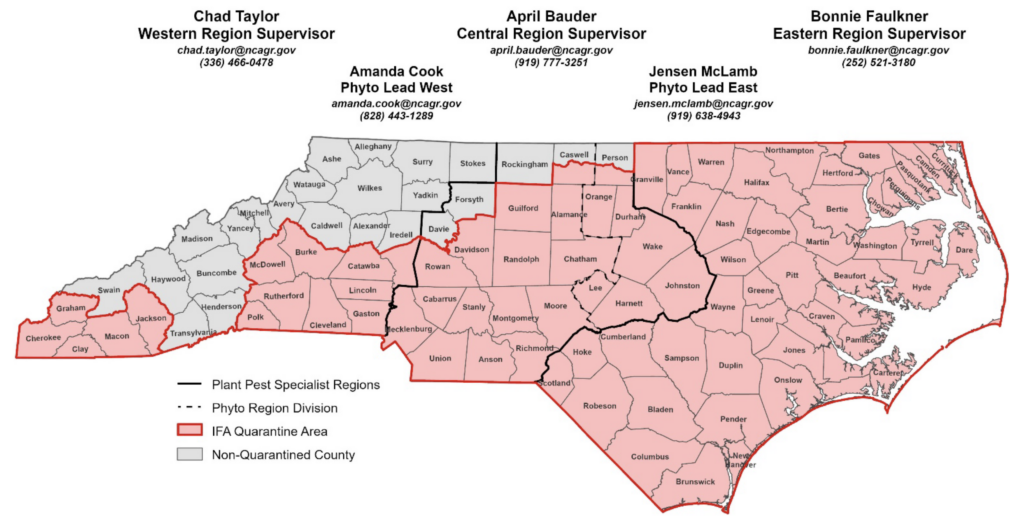Moving Hay From Fire Ant Quarantine Areas (Helene Recovery)
go.ncsu.edu/readext?1032710
en Español / em Português
El inglés es el idioma de control de esta página. En la medida en que haya algún conflicto entre la traducción al inglés y la traducción, el inglés prevalece.
Al hacer clic en el enlace de traducción se activa un servicio de traducción gratuito para convertir la página al español. Al igual que con cualquier traducción por Internet, la conversión no es sensible al contexto y puede que no traduzca el texto en su significado original. NC State Extension no garantiza la exactitud del texto traducido. Por favor, tenga en cuenta que algunas aplicaciones y/o servicios pueden no funcionar como se espera cuando se traducen.
Português
Inglês é o idioma de controle desta página. Na medida que haja algum conflito entre o texto original em Inglês e a tradução, o Inglês prevalece.
Ao clicar no link de tradução, um serviço gratuito de tradução será ativado para converter a página para o Português. Como em qualquer tradução pela internet, a conversão não é sensivel ao contexto e pode não ocorrer a tradução para o significado orginal. O serviço de Extensão da Carolina do Norte (NC State Extension) não garante a exatidão do texto traduzido. Por favor, observe que algumas funções ou serviços podem não funcionar como esperado após a tradução.
English
English is the controlling language of this page. To the extent there is any conflict between the English text and the translation, English controls.
Clicking on the translation link activates a free translation service to convert the page to Spanish. As with any Internet translation, the conversion is not context-sensitive and may not translate the text to its original meaning. NC State Extension does not guarantee the accuracy of the translated text. Please note that some applications and/or services may not function as expected when translated.
Collapse ▲[Download a PDF version of this post.]
The imported fire ant (Solenopsis invicta; IFA) is a federally regulated invasive species that is a threat to agriculture and poses a health concern to humans, livestock and wildlife due to its painful sting and venom. IFA are notorious hitchhikers that can move in bales of hay and straw that have been stored on the ground.
At present, 79 counties in North Carolina are fully or partially quarantined for imported fire ant. Unfortunately, the areas hardest hit by Hurricane Helene are the counties in the state where IFA has not yet established. The North Carolina Department of Agriculture and Consumer Services – Plant Industry Division (NCDA&CS-PID) has the utmost sympathy for the communities devastated by the storm and recognizes the dire need for hay during this critical response phase.
On-site IFA hay inspections by NCDA&CS staff in Western North Carolina are not logistically feasible, but we are sensitive to the emergency need for hay to reach its destination quickly. Many agencies, individuals and volunteer groups are working diligently to ensure livestock have the hay they need. During the current emergency response phase, below are management practices for hay distribution sites that will reduce the risk of moving IFA in hay bales.
- Whenever possible, have the hay inspected by your state department of agriculture before it is loaded in a quarantine area (see maps). NCDA&CS Plant Industry Division staff will prioritize these inspections when contacted (see contact details below). Shippers with out-of-state inspection agencies can contact Joy Goforth at (919) 707-3753.
- Use a bait to treat hay storage areas to prevent establishment at distribution locations.
- Connect hay recipients with Extension for treatment recommendations should they suspect they have transported IFA to their farm, and ask them to follow up with the NCDA&CS Plant Industry Division.
- If the shipment originates in a quarantined area and will not exit or pass through a non-regulated area, no inspection is required.
 NCDA&CS-PID Plant Pest Specialists | Areas and Contact Details
NCDA&CS-PID Plant Pest Specialists | Areas and Contact Details
| REGION | COUNTIES | CONTACT | PHONE |
| Region 1: | Bertie, Camden, Chowan, Currituck, Dare, Gates, Hertford, Hyde, Pasquotank, Perquimans, Tyrrell, Washington |
Joe Davenport | (919) 608-0635 |
| Region 2: | Nash, Wilson | Bonnie Faulkner | (252) 521-3180 |
| Region 3: | Edgecombe, Green, Lenoir, Martin, Pitt | VACANT | (252) 521-3180 |
| Region 4: | Franklin, Granville, Halifax, Northampton, Vance, Warren | Derreck Long | (252) 567-1247 |
| Region 5: | Beaufort, Carteret, Craven, Jones, Onslow, Pamlico | Juliet Whitehurst | (919) 707-3730 |
| Region 6: | Duplin, New Hanover, Pender, Sampson, Wayne | Jonathan Bass | (919) 270-4910 |
| Region 7: | Durham, Orange, Person, Wake | April Bauder | (919) 777-3251 |
| Region 8: | Chatham, Harnett, Johnston, Lee | Cassandra Dolce | (919) 909-0605 |
| Region 9: | Bladen, Brunswick, Columbus, Cumberland, Hoke, Robeson, Scotland | Chris Carter | (919) 218-8654 |
| Region 10: | Alamance, Caswell, Forsyth, Guilford, Randolph, Rockingham | April Bauder | (919) 777-3251 |
| Region 11: | Cabarrus, Davie, Davidson, Mecklenburg, Rowan | Daniel Brewer | (704) 249-5940 |
| Region 12: | Alleghany, Iredell, Stokes, Surry, Wilkes, Yadkin | Ginger Hemmings | (336) 314-9334 |
| Region 13: | Anson, Montgomery, Moore, Richmond, Stanly, Union | Samuel Harris | (919) 604-3896 |
| Region 14: | Burke, Catawba, Cleveland, Lincoln, Gaston, Alexander | John Eaton | (919) 448-7766 |
| Region 15: | Ashe, Caldwell, Watauga | Chad Taylor | (336) 466-0478 |
| Region 16: | Avery, Haywood, Madison, Mitchell, McDowell, Yancey | Tim Hartley | (828) 260-0588 |
| Region 17: | Buncombe, Henderson, Polk, Transylvania, Rutherford | Sue Dial | (828) 577-0915 |
| Region 18: | Cherokee, Clay, Graham, Jackson, Macon, Swain | Ryan Holquist | (828) 421-5445 |



